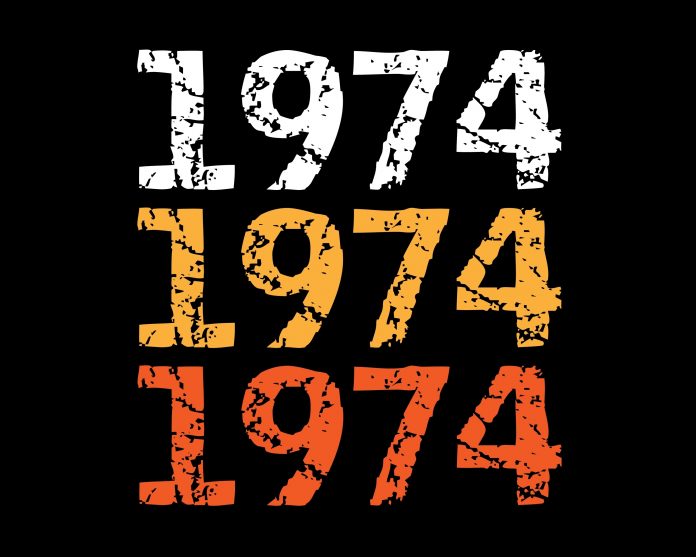The year 1974 was a particularly good one for cinema, studded with hit films. However, 50 years later, the films that remain in memory are not the ones that were successful at the box-office, but those that had something to remember them by. 1974 was the year of Godfather ll, The Great Gatsby, a spate of disaster movies in Hollywood, while in Bollywood, stars like Dharmendra, Hema Malini, Rajesh Khanna, Zeenat Aman were still ruling, the man who would be king—Amitabh Bachchan—was still to be coronated. Tough to pick just 10, but these are among the unforgettables half a century later:
Ankur:
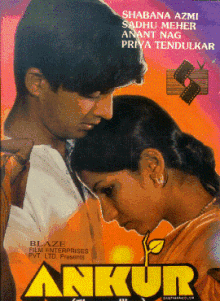
Shyam Benegal’s debut film, a work of passion and power that was among the films that heralded the New Wave or parallel cinema movement. It was Shabana Azmi’s first film and started her on a track of awards and acclaim unmatched in Indian cinema. The story of feudal oppression told in a straightforward manner, through the illicit affair between a village landlord Surya (Anant Nag), and a Dalit woman Laxmi (Azmi), that causes some turbulence in their lives and in the village. The last shot of a child throwing a stone at Surya’s house is a striking symbol of rebellion against upper class brutality.
Aap Ki Kasam:
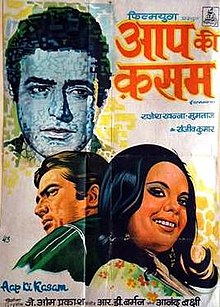
Mainstream cinema, believing in the happily-ever-after, seldom considered a broken marriage. This J Om Prakash film (a remake of the 1970 Malayalam movie Vaazhve Mayam) had a dramatic story of a couple torn apart due to the husband’s suspicious nature. Kamal (Rajesh Khanna) accuses his wife Sunita (Mumtaz) of having an affair with Mohan (Sanjeev Kumar). Her father (Rehman) gets her to divorce him and remarry—at a time in Indian society when divorce was rare. Apart from the star cast, the film had a hit Anand Bakshi-RD Burman score; every Holi, the bhaang song, Jai Jai Shiv Shankar, is blared on a speakers all over the country.
Rajnigandha:
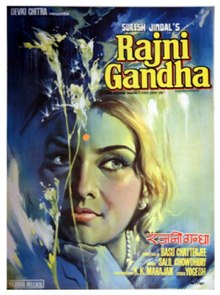
Basu Chatterjee’s gentle love triangle based on a Manu Bhandari story, starred Vidya Sinha, Amol Palekar and Dinesh Thakur. Deepa is in love with the chatterbox Sanjay, whose absent mindedness exasperates her; on a work visit to Mumbai, she reconnects with college sweetheart Navin, and is confused about her feelings. The film is one of the list of what came to be known as middle-of-the-road cinema, which combined the realism of art movies with elements from the mainstream. It turned out to be a hit, and for a while Amol Paleker, who made his Hindi movie debut with this film, was called the poor man’s Amitabh, with his track record of small and medium budget hits.
Roti Kapda Aur Makaan:
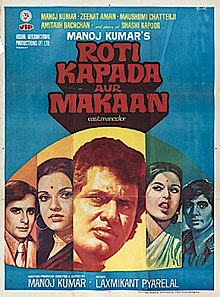
That was the time when Manoj Kumar’s melodramas were blockbusters; for this one, he lined up a star cast including Amitabh Bachchan, Shashi Kapoor, Zeenat Aman and Moushumi Chatterjee. He played Bharat, the oldest brother of an impoverished family, who has to make sacrifices to provide for brothers and sister, and see his beloved leave him to marry a rich man. This film, like all the others had a hit Laxmikant-Pyarelal score, with songs like Mehngai Maar Gayi, Hai Hai Yeh Majboori, Main Na Bhoolunga. It was the apogee of his seven-film career as a director, the quality of his work slid after this, though Kranti (1981) was a box-office success.
Woh Main Nahin:
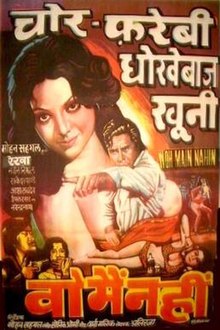
This is the age of Tinder swindlers and wedding cons, but PK Atre’s Marathi play To Mee Navhech was about a man who cheated a succession of women, by marrying them and then running off with their money. Mohan Segal’s Hindi film adaptation that watered down the satire, starred Navin Nischol as Vijay, who is arrested and stands trial. But each time a witness accuses him, he claims it wasn’t him. Co-starring Rekha, Padmini Kapila, Asha Sachdev, the film was funny, suspenseful and entertaining.
Blazing Saddles:
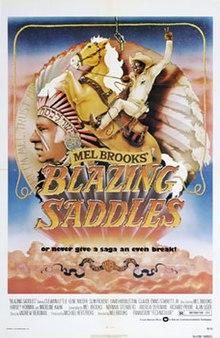
Directed and so-written by Mel Brooks, who also starred in it with Gene Wilder and Cleavon Little, this satirical Western is ranked at number six on the American Film Institute’s 100 Years 100 Laughs list. With his irreverent wit, Brooks took on corrupt politicians and racism. To make money off the land when a new railroad is commissioned, a wily politician makes a plan to get rid of the town’s population. A black sheriff is appointed with the idea that the townsfolk will be so offended, that they will leave. Needless to say, the plan fails, but in the process, one of the funniest films of all time takes shape, which offers fresh delights on every repeat viewing.
Chinatown:
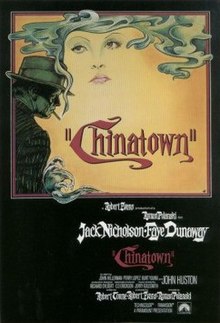
The neo-noir thriller directed by the controversial Roman Polanski, starring Jack Nicholson and Faye Dunaway, was nominated for 11 Oscars, won for Best Original Screenplay and is often listed among the greatest films of all time. The much-imitated plot, is set in 1937 Los Angeles, where a private investigator Jake ‘J J’ Gittes is hired by a woman called Evelyn to spy on her husband Hollis Mulwray, who she suspects of cheating on her. As he follows Mulwray, Gittes discovers some high-level wheeling dealing, and also that the man is being framed, because he is opposed to the corrupt schemes that are unfolding in the drought-ridden town. A terrific film by all standards and a must-watch.
The Towering Inferno:
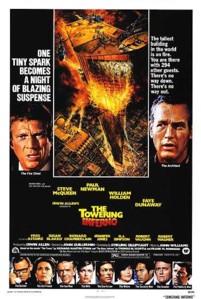
Hollywood went through a phase of disaster films in the 1970s, and this one directed by John Guillermin set high standards. A winner of three Oscars, the film had an amazing line up of stars including Paul Newman, Steve McQueen, Faye Dunaway, William Holden, Fred Astaire and many more. The plot was simple, 138-story glass skyscraper in the heart of San Francisco is being celebrated as the world’s tallest building, with a glamorous party, full of hotshot guests. The building’s architect, suspects that the contractors have used poor quality wiring, and sure, enough the glass structure catches fire, and 300 guests are trapped on the 135th floor, with rescue plans turning out to be tough at that height and with limited time. The technical wizardry that went into it, before the era of CGI is awe-inspiring.
Alice Doesn’t Live Here Anymore:
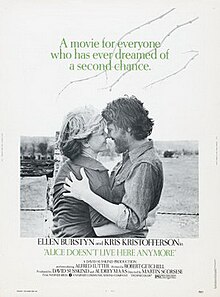
Before Martin Scorsese became such a moghul, making big, splashy crime movies, he made a small, sweet dramedy about the recently widowed Alice, who has to restart her life, along with her 11-year-old son, Tommy. She embarks on a road trip to her hometown, planning to get singing gigs on the way to pay for it. Of course, it doesn’t quite work out that way, and she ends up doing a waitressing job at a small-town diner, where she bonds with a disparate bunch of people, and envisions a future with a local rancher. Ellen Burstyn played Alice and won an Oscar for a role. Who could have imagined Scorsese making a chick flick?
Death Wish:
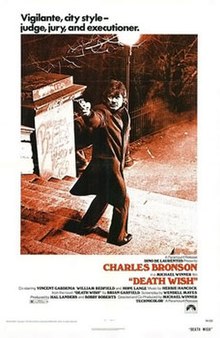
Charles Bronson playing a lone vigilante was such a hit, that the plot was imitated not just in Hollywood, but elsewhere too. In the Michael Winner film, he played Paul Kersey, a mild-mannered architect, transformed into a killer of street criminals, after his wife is murdered and daughter raped by muggers. He stalks the streets by night shooting muggers, which results in such a decrease in street crime, that the cops do not really want to catch him. The film was criticised for its violence, but also appreciated by audiences worried about increasing crime rates. The echoes of this film are still booming in moves around the world—the mark of a cult movie.



